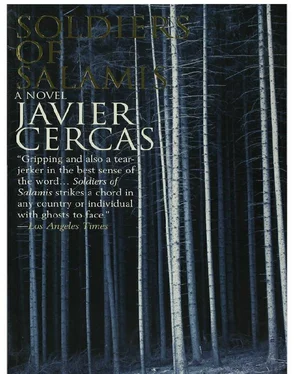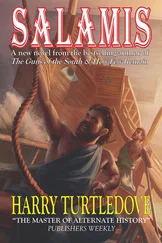As a matter of fact, they weren't. At least not entirely. The story of the writer facing the firing squad at Collell and the circumstances surrounding it had so intrigued me, that after interviewing Ferlosio I started to feel curious about Sánchez Mazas; also about the Civil War, of which till then I'd known not much more than I did about the battle of Salamis or the exact use of the jack plane, and about the horrific stories that war produced, which till then I'd considered excuses for old men's nostalgia and fuel for the imagination of unimaginative novelists. Coincidentally (or maybe not so coincidentally), it became fashionable around that time for Spanish writers to rehabilitate Falangist writers. It had actually started earlier, in the mid-1980s, when certain refined, influential publishers released the occasional volume by some refined, forgotten Falangist, but by the time I became interested in Sánchez Mazas, in some literary circles they weren't just rehabilitating the good Falangist writers, but also the average and even the bad ones. Some ingenuous souls, including a few guardians of left-wing orthodoxy and the odd mischief-maker, declared that rehabilitating a Falangist writer was vindicating (or laying the groundwork to vindicate) Falangism itself. The truth was exactly the opposite: rehabilitating a Falangist writer was just rehabilitating a writer; or more precisely, it was vindicating themselves as writers by rehabilitating a good writer. I mean that the fashion arose, in the best cases (the worst aren't worth mentioning), from the natural need all writers have to invent their own tradition, from a certain urge to be provocative, from the problematic certainty that literature is one thing and life another and that it was therefore possible to be a good writer at the same time as being a terrible person (or a person who supports and foments terrible causes), from the conviction that we were being literarily unfair to certain Falangist writers, who, to use Andrés Trapiello's phrase, had won the war but lost literature. Be that as it may, Sánchez Mazas did not escape this collective disinterring: in 1986 his collected poetry was published for the first time; in 1995 a popular series included a new edition of his novel The New Life of Pedrito de Andia in 1996 another of his novels, Rosa Kriiger, also appeared in a new edition, having actually been out of print since 1984.1 read all those books then. I read them with interest — with pleasure even — but not enthusiasm: it didn't take me long to conclude that Sánchez Mazas was a good writer, but not a great writer, though I doubt I'd have known how to clearly explain the difference between a great and a good writer. I remember, in the months or years that followed, randomly gathering bits and pieces about Sánchez Mazas from things I read, and even coming across the odd summary and vague allusion to the episode at Collell.
Time passed. I began to forget the story. One day at the beginning of February 1999, the year of the sixtieth anniversary of the end of the Civil War, someone at the paper suggested the idea of writing a commemorative article about the tragic last days of the poet Antonio Machado who, in January 1939 (together with his mother, his brother José and some hundreds of thousands of their utterly terrified compatriots), driven by the advance of Franco's troops, fled from Barcelona to Collioure, on the other side of the French border, where he died a short time later. The episode was very well known, and I rightly thought that not a single Catalan (or non-Catalan) journalist would manage to avoid recalling it at some point during the anniversary, so I'd resigned myself to writing the standard time-honoured article when I remembered Sánchez Mazas and that his botched execution had occurred more or less at the same time as Machado's death, except on the Spanish side of the border. I then imagined that the symmetry and contrast between these two terrible events — a kind of chiasmus of history — was perhaps not coincidental and that, if I could manage to get across the substance of each within the same article, the strange parallel might perhaps endow them with new meaning. This belief took hold when, as I began to do a little research, I stumbled across the story of Manuel Machado's journey to Collioure, which he made shortly after the death of his brother Antonio. Then I started to write. The result was an article called 'An Essential Secret' Since, in its way, it's also essential to this story, I include it here:
Sixty years have passed since the death of Antonio Machado in the last days of the Civil War. Of all the stories contained in that history, one of the saddest is no doubt Machado's, because it ends badly. It has been told many times. He came to Barcelona from Valencia in April 1938, accompanied by his mother and his brother José, and stayed first in the Hotel Majestic and later in the Torre de Castaner, an old mansion on Sant Gervasi avenue. There he kept doing what he'd been doing since the beginning of the war: using his writing to defend the legitimate government of the Republic. He was old, weary and ill, and he no longer believed in Franco's defeat. He wrote 'This is the end; any day now Barcelona will fall. For the strategists, for the politicians, for the historians, it is all clear: we have lost the war. But in human terms, I am not so sure. Perhaps we have won.' Who knows if he guessed right about that last bit; without doubt he was right about the first. The night of 22 January 1939, four days before Franco's troops took Barcelona, Machado and his family left in a convoy for the French border. Other writers accompanied them on that nightmarish exodus, among them Corpus Barga and Carles Riba. They made stops in Cervia de Ter and Mas Faixat, near Figueres. Finally, the night of the 27th, after walking 600 metres through the rain, they crossed the border. They'd been obliged to leave their luggage behind and they had no money. Thanks to the help of Corpus Barga, they managed to make it to Collioure and get rooms in the Hotel Bougnol Quintana. Less than a month later the poet died; his mother survived him by three days. In the pocket of his overcoat, his brother José found a few notes; one of them was a verse, perhaps the first line of his last poem: 'These blue days, this childhood sun.'
The story doesn't end here. Shortly after the death of his brother Antonio, the poet Manuel Machado, who lived in Burgos, learned of it through the foreign press. Manuel and Antonio were not just brothers, they were intimates. The uprising of 18 July had caught Manuel in Burgos, rebel territory; Antonio, in Madrid, Republican territory. It is reasonable to assume that, had he been in Madrid, Manuel would have been loyal to the Republic; it would perhaps be idle to speculate what might have happened if Antonio had chanced to be in Burgos. The fact is, as soon as he heard the news of his brother's death, Manuel procured a safe-conduct and, after travelling for days across a Spain that had been reduced to ashes, arrived in Collioure. At the hotel he learned his mother had also died. He went to the cemetery. There, before the graves of his mother and his brother Antonio, he met his brother José. They talked. Two days later Manuel returned to Burgos.
But the story — at least the story I now want to tell — doesn't end here either. At more or less the same time that Machado died in Collioure, Rafael Sánchez Mazas faced a firing squad near the Sanctuary of Collell. Sánchez Mazas was a good writer; he was also a friend of José Antonio, and one of the founders and ideologues of the Falange. His adventures in the war are shrouded in mystery. A few years ago his son, Rafael Sánchez Ferlosio, told me his version. I don't know whether or not it is strictly true; I'm just telling it as he told me. Trapped in Republican Madrid by the military uprising, Sánchez Mazas sought refuge in the Chilean Embassy. He spent most of the war there; towards the end he tried to escape hidden in the back of a truck, but they arrested him in Barcelona and, as Franco's troops approached the city, he was taken towards the border. Before crossing it they assembled a firing squad; but the bullets only grazed him, and he took advantage of the confusion to run and hide in the woods. From there he heard the voices of the militiamen pursuing him. One of them finally found him. He looked Sánchez Mazas in the eye. Then he shouted to his comrades 'There's nobody over here!', turned and walked away.
Читать дальше












